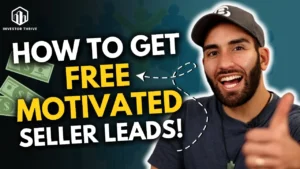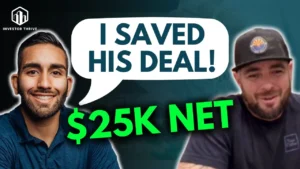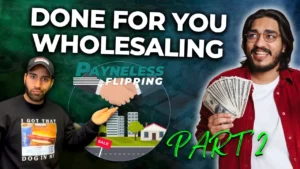Welcome back to the channel everyone. Now today, we’re going to be talking about how to get started investing in rental properties. Now, the experience that I have, the story we’re going to be going over today, I’m actually sitting down with another investor who’s been investing for several years now. He used to be a mortgage broker, and he told me how he got started investing in rental properties and in real estate. And actually, he actually backed himself into getting into rental properties, and he didn’t even mean to. So you don’t always have to be meaning to get rental properties for it to happen. As a real estate investor, we come across a lot of deals. Sometimes we flip properties and they don’t sell, so we come take them down, we do the burr method. So today, listen to this interview that I had with Michael Pinter about how he got started in real estate investing and how he got started with his first rental property, and he said he made over $60,000 on it. Let’s dive right in.
Thanks for tuning in, everybody. Now, before we dive into this video of me talking with Michael Pinter, I want to invite you to a master class that I have if you’ve been looking to get into rental properties in real estate in general, I have a masterclass that I teach every Thursday, absolutely free to come, all you have to do is click on the link below to painlessflipping.com and we’ll show you exactly how to get started in real estate investing. Without further ado, let’s dive right into the video. Michael, tell us a little bit about yourself, and then let’s dive into that first deal you did. Sure. So I was in the mortgage business for this working for the same company for 17 years, from 1997 to 2013 and then I was dabbling a little bit in real estate investing while I was there. And then 2013 I left the mortgage industry five years too late, and I decided to go full time into a real estate investing and I had some experience in this city, cities called Elmont. I operate in Long Island, so Nassau and Suffolk County, New York city suburbs, and Elmont was my area. I bought another property there. I liked the area.
I thought it was a misunderstood area where I could take advantage of some of that misunderstanding. And there was a property that I kept driving by that I really you’re talking about your first deal right now. First deal, yes, okay, yeah, no. So just, just so I can understand, you were doing mortgages, as I read, said, Yeah, I was in the mortgage business. I did everything in the mortgage company, secondary marketing. I ran an office. I did a lot of things. Things were great for about 11 years, and then everything hit the fan in 2008 2009 I sort of stuck it out an extra few years, which was a huge mistake. I should have left earlier. I really should have gone into real estate investing earlier, but I got added to complete 2013 and beginning in 2013 I went into full time real estate investing. Nice.
Okay, okay, because I wanted to clarify when you said you got that too early. I didn’t know what time, at what time point you did that. Okay, cool. So, so let’s dive in this first deal. You said, hey, it was a it took a while. And I think just from you telling me a little bit before we hopped on, it sounded, seemed a little a little a little complicated. It wasn’t just a wholesale deal where you just get it and then you assign it. So a couple things, really. For the first four years I was in business, from 2013 2017 I didn’t even know what wholesaling was. I had heard of it. I thought wholesalers were like knuckle dragging Neanderthals who try to make like, $500 on a deal. I thought rehabbers were the guys who made the money, so I didn’t really understand the whole concept. I didn’t do any marketing direct to seller. For those four years, I bought everything at live or I went to live auction in my county every single week. I bought at online auctions, and I bought from REO agents. So the real estate owned agents, bank owned property, and there was a lot of that then, because a lot of the crap from 2008 2009 in New York, everything takes a lot longer than every other place, and that was coming out of time. And in general, we can get into this more if you want, but New York is dramatically different than all the other 49 states. Everything takes longer. There’s a turn of the wild in every in every transaction, there’s even more. But I wasn’t wholesaling, right?
So this property I bought, I had a partner. We bought it, we borrowed money for it, and we took it down. It was a house that I kept driving by, and it just was in the area that I really liked. Was an ugly looking house when we got inside. So what happened was, I was always dreaming about buying this house, and then one day, a for sale sign showed up, and it was a bank owned property. So we went inside the roof. In one section, it was caved in completely, and and we bought it. I think we bought it for some there, you know, high twos. And it really did crazily. It didn’t need that much work. It needed that roof fixed and the flooring underneath the roof, but it didn’t need that much. But it was, it was a single, legally, a single family that was taxed by the county as a two family, but it was set up as a three unit. So happens to be in this area of Elmont, there’s a lot of illegal units, a lot of basements being rented illegally. And as they would say, ADUs, right? Accessory or additional dwelling units, but most of them are illegal, and the township doesn’t like it. But we bought this property, we fixed it up without spending a lot. And last question, does that make it more valuable if it is three units, two units versus just one?
So it’s funny for some people, yes, right? There are people who will look at that and say, This is a dream come true, right? I can live in one of the units, and I can pretty much have my mortgage paid by the others. But for other people, they’re scared. They’re scared because somebody might complain to the town. They may have to kick somebody out, or their attorney might say, Oh, no, you have tremendous liability. The truth is, this is a game that’s played all the time, but it depends on the buyer. Is really the answer? Okay? Makes sense. So we bought the property and we tried to sell it. Shockingly, no one wanted to buy it because of the things that we just discussed the extra unit, and we really didn’t do a lot of work to it. Really wasn’t in great shape, and we had a hard money loan on it. We got on our first hard money loan. I think we paid 16% with six points, some crazy number. We were so happy to get anybody to fund the deal that we just took it, and we used all of our own money for the rest of it, and we didn’t know what we were doing, so couldn’t sell right away, so we immediately rented it. We got it rented in three seconds, and we were cash flow positive, so it was working out, and we
rented one unit, or did you do? Rented all three, rented all three to three separate people, and then one of the tenants that we rented. Said that she was interested in a rent to own kind of situation. So we did a rent to own where we gave her a number.
I think that number was like 425,000 we paid like 284 and everything. Did you take? Did you get a certain amount of money down from her? We didn’t. We just, we took, we raised her rent a little bit, and then, and then we let, we let the additional rent go to pay, go towards her down payment. Okay, they’re an extra two we extra for an extra $200 and in the lease, it said $200 a month. If they execute this option to buy it was going to go towards her down payment. Got it, and then after about a year and again, we were cash flow positive all time. So it’s great. She executed, and she and we sold it and she refined, I’m assuming she got a loan, and we got a purchase
loan on it. She took money on it. We probably made more than 60, if I’m thinking about it, we probably made more. Yeah, it sounds like it made 80, but it was hard to figure because we were so cash poor that we were taking all that additional cash flow and immediately spending on on all of our operations, because we, you know, we needed the money at that time.
That’s how it works, you know. So looking back at that deal, what would you have done differently? Or what do you feel like you executed on it just like you probably would now, except for the hard money loan, you probably know, somebody else would probably give you a better deal, but you feel like you did what was right at that time, right? And by the way, we refinanced that hard money loan. We got a regular Fannie Mae loan that helped a ton. Yes, that helped a lot. But what would we what I’ve done, I don’t know if I would have done much differently. I probably would have taken an un-refundable, a bigger deposit when she moved in.
I don’t know if she had the money. Oh, when she did a rent to own. You mean, yeah, okay, like, I don’t, I don’t think she had a lot of cash at the time. Was she sorry? Was she a current tenant at the time? And then she was like, hey, no, no. Before she moved in, she mentioned she was interested in rent to own, and we looked at it. This may be the only person that’s ever going to buy this, and that’s what we did. That’s what we did. That makes sense. I’m sorry. I thought she was already living there. And then approached you guys. Said, Hey, you thought about selling this, no, but this was a new and then you, you know, you had that option of fall, okay, right? If
we weren’t cash flow positive, we probably wouldn’t have, wouldn’t have done it. But, you know, with three rental incomes coming in, probably the only thing I can think of is that maybe, maybe we should have kept it because, like every property values have gone up so much and the rents have gone up so much that it would have been a tremendous cash cow short of that. I think, I think we did, I think we did most things right on that. I don’t think we really screwed that up. Too bad. Amazing.
So let’s talk. So we talked about your first deal, and it seems like you might have a little bit more experience, or, I would say, a lot more experience than like, the person that just dives in doesn’t know what they’re doing, sounds like you had experience on how to navigate the situation. So for someone that’s listening that doesn’t, what do you think like, if they’re in a situation like that, would you recommend like they buy it, it’s not they can’t resell it, you would, would you recommend renting it out? I guess you’d have to see the situation. But
I think any, any situation where you can sell a property and you can be cash flow positive by renting it, and you can, if you have a hard money loan, you can refinance it, you know the basically the burn method, right? I think it’s a good plan. In in my area, single family homes are almost never cash flow positive because my price points are much higher. I’m buying stuff for three, 400 $500,000 and the taxes here are very high. But if you’re in most parts of the country, if you you become what’s it called an accidental landlord, right? If you can’t sell the property for whatever reason, you could rent it and then figure things out, hopefully it appreciates or you figure out what to do with it later.
Yeah. Unfortunately, we were doing that because of the pandemic. When the interest rates rose, we weren’t able to sell our flips, so we had to take them down. You know, crazy. If you liked that video and you find that information helpful, hit that subscribe button and help us grow this channel. See on the next one you.




